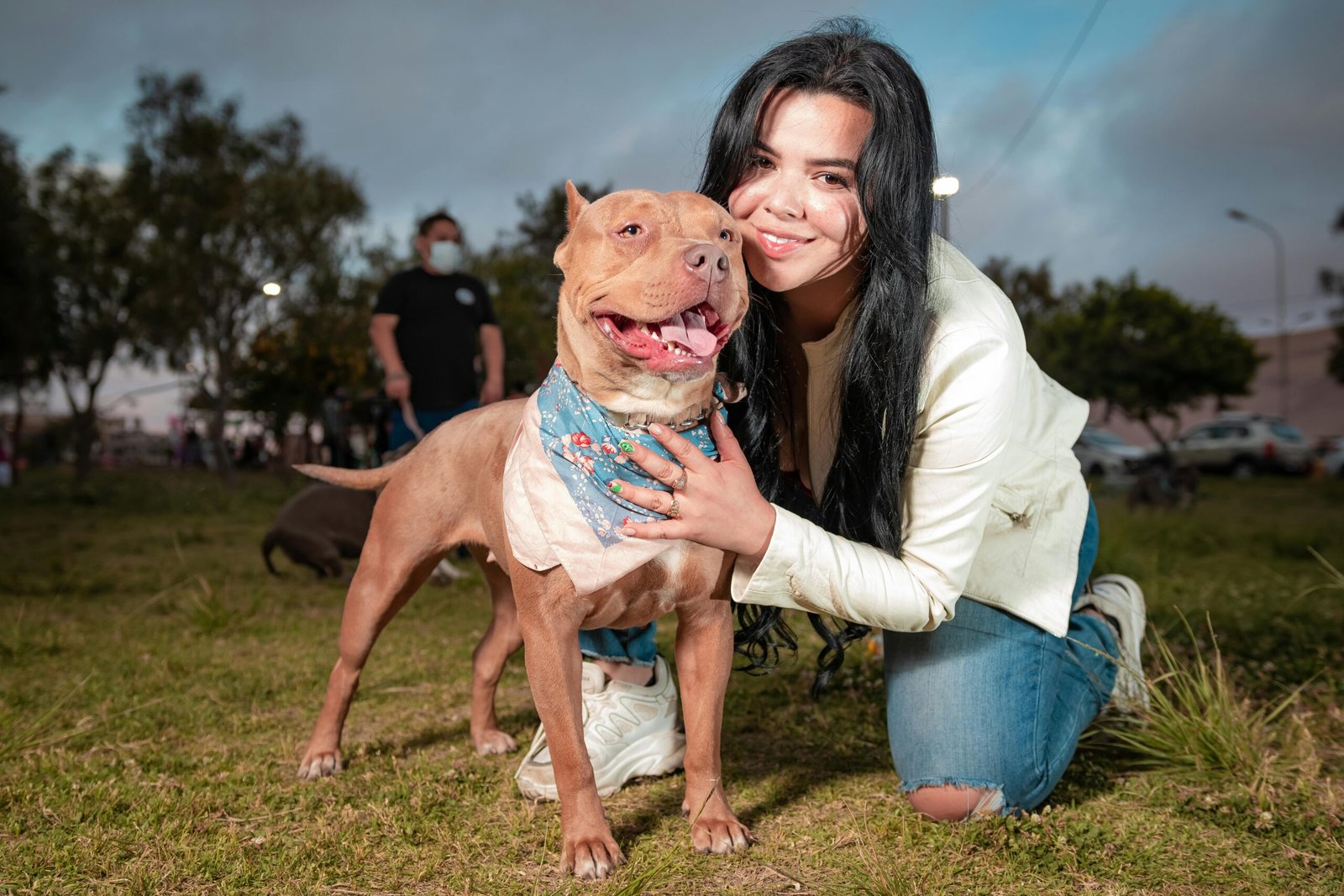Introduction
If you’ve welcomed a dog into your home, congratulations! You’ve chosen a breed known for its loyalty, affection, and incredible capacity for love. But whether you’re a first-time dog parent or have years of experience with these misunderstood canines, there’s one critical mistake that even the most well-intentioned owners make—and it could be affecting your dog’s wellbeing and your relationship with them. It’s essential to recognize the importance of proper training and socialization for your beloved dog.
Pit bulls are among the most loyal and affectionate breeds, making them wonderful companions for families.
It’s crucial to understand that proper training can help pit bulls overcome negative stereotypes.
Owning a pit bull requires a commitment to their training and socialization from an early age.
Before we reveal this common pitfall, let’s address something important: certain breeds are among the most stigmatized dog breeds in America. Despite their negative portrayal in media, proper understanding and training can transform these powerful canines into the gentle, loving companions they’re naturally inclined to be.
In this comprehensive guide, we’ll explore the number one mistake pit bull owners make, why it happens, and most importantly, how to avoid it. We’ll also share expert insights from veterinarians, professional trainers, and long-time pit bull advocates to ensure you and your four-legged friend enjoy the best possible life together.
Understanding the Pit Bull: Beyond the Stereotype
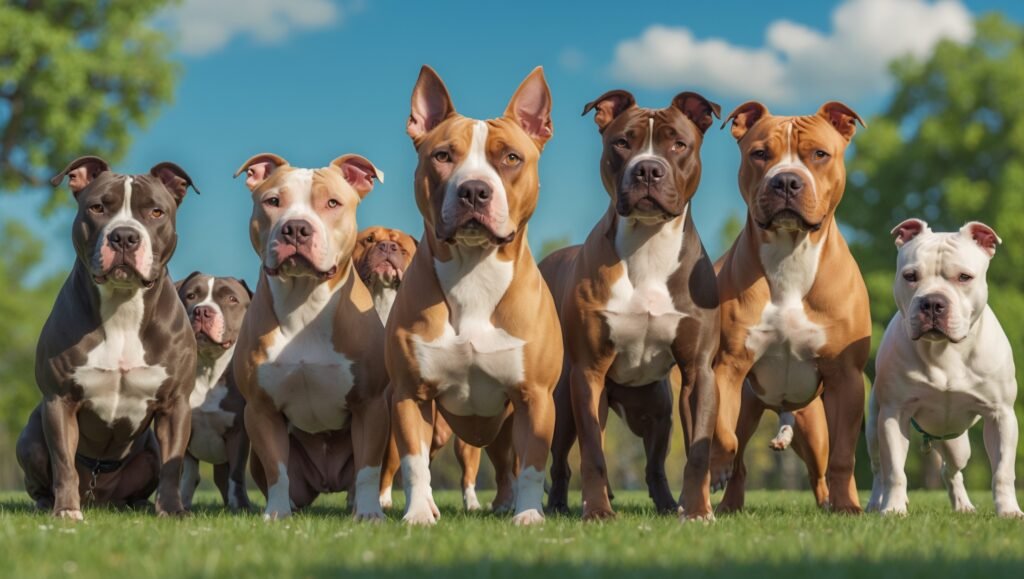
Before diving into common mistakes, it’s crucial to understand what we mean by “pit bull.” The term doesn’t actually refer to a single breed but rather encompasses several breeds including the American Pit Bull Terrier, American Staffordshire Terrier, Staffordshire Bull Terrier, and sometimes the American Bully.
These dogs share a history of being bred for strength and determination, traits that made them excellent working partners. Today’s breeds retain many of these positive characteristics:
Pit bulls thrive when they receive proper training and socialization from an early age. This sets the foundation for a happy and balanced life.
- Exceptional loyalty to their families
- High intelligence and trainability
- Energetic and playful personalities
- Strong desire to please their owners
- Natural affinity for children when properly socialized
Understanding these inherent traits is the first step toward avoiding the biggest mistake owners make with their dogs.
The #1 Mistake: Inadequate Socialization
Understanding your pit bull’s needs is critical to their happiness and social behavior.
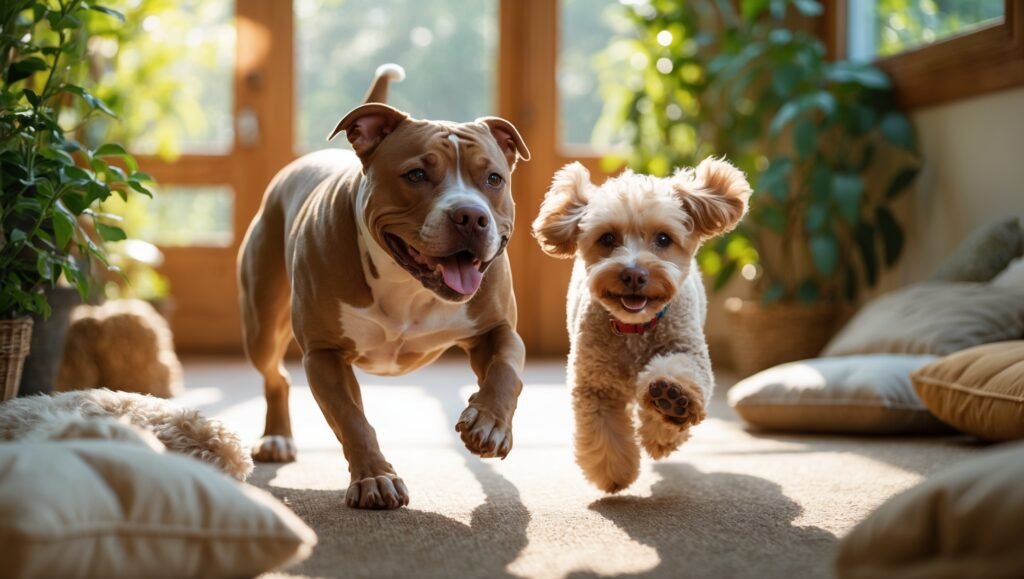
The number one mistake owners make is inadequate socialization during their dog’s critical developmental periods. This mistake stems from either underestimating the importance of socialization or, ironically, being overly protective due to concerns about breed stereotypes.
Why Socialization Matters More for Pit Bulls
Proper socialization is essential for pit bulls to thrive in their environments.
Pit bulls, like all dogs, need proper socialization to develop into well-adjusted adults. However, this process is particularly crucial for pit bull-type dogs for several reasons:
- Public Perception: Because of existing stereotypes, a well-behaved pit bull isn’t just a personal goal—it’s an ambassador for the breed.
- Physical Strength: Their natural strength means that behaviors that might be merely annoying in smaller breeds can be perceived as threatening in pit bulls.
- Strong Loyalty: Their intense devotion to their families can transform into overprotectiveness without proper socialization.
- Legal Implications: In some areas, breed-specific legislation means pit bulls are under greater scrutiny, making exemplary behavior essential.
Dr. Jennifer Martinez, veterinary behaviorist at Central Valley Animal Hospital, explains: “Many pit bull owners come to me with adolescent or adult dogs showing fear-based aggression toward strangers or other dogs. Almost invariably, we can trace these issues back to insufficient socialization during the critical window between 3-14 weeks of age.”
The Consequences of This Mistake
Many pit bull owners may not realize the importance of proper socialization until it’s too late, impacting both the pit bull’s behavior and the owner’s experience.
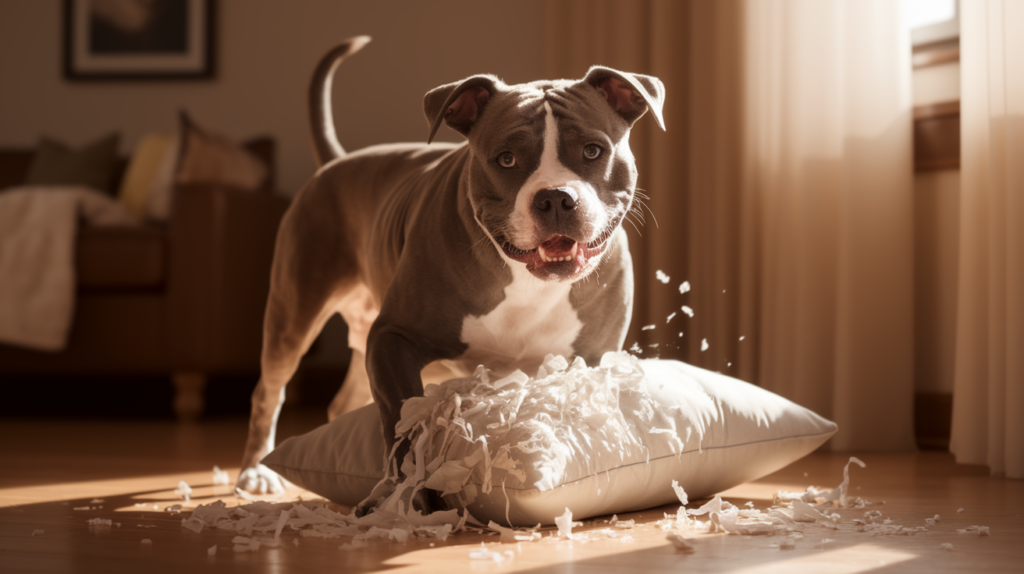
When pit bulls aren’t properly socialized, the consequences can include:
Successful socialization experiences can significantly enhance a pit bull’s adaptability.
- Fear-based reactivity to unfamiliar people or animals
- Difficulty adapting to new environments or situations
- Increased anxiety that can manifest as destructive behaviors
- Limited lifestyle options (can’t go to dog parks, outdoor cafes, etc.)
- Reinforcement of negative breed stereotypes
Owners should recognize that well-socialized pit bulls can showcase the breed’s best traits.
These outcomes are particularly heartbreaking considering the breed’s natural inclination to be sociable and people-oriented.
Effective socialization requires a structured approach that begins early and continues throughout your dog’s life. Here’s a comprehensive strategy:

Effective socialization requires a structured approach that begins early and continues throughout your dog’s life. Here’s a comprehensive strategy:
For Puppies (8-16 weeks)
This period represents the critical socialization window where puppies are most receptive to new experiences:
- Exposure to diverse people: Introduce your puppy to people of different ages, genders, ethnicities, heights, and those wearing various clothing items (hats, sunglasses, uniforms).
- Controlled dog interactions: Arrange playdates with known, vaccinated, well-behaved dogs before venturing to busier environments.
- Environmental variety: Expose your puppy to different floors (carpet, hardwood, grass, concrete), sounds, and locations.
- Positive associations: Always pair new experiences with treats, praise, and play to create positive connections.
For Adolescent Pit Bulls (4-18 months)
This challenging period often coincides with increased strength and independence:
- Consistent training: Reinforce basic commands and impulse control exercises daily.
- Structured socialization: Continue exposure to new environments but with clear boundaries and expectations.
- Focus on calm behavior: Reward relaxed responses to stimulating situations rather than excited ones.
- Professional support: Consider adolescent training classes specifically designed for powerful breeds.
For Adult Pit Bulls
Even adult dogs with socialization gaps can improve with the right approach:
- Professional assessment: Work with a force-free trainer experienced with pit bulls to evaluate your dog’s specific needs.
- Gradual desensitization: Slowly introduce triggers at a distance where your dog remains calm, gradually decreasing that distance.
- Management strategies: Learn to recognize your dog’s stress signals and remove them from overwhelming situations.
- Build confidence: Use positive reinforcement to build your dog’s confidence in previously challenging situations.
Beyond Socialization: Other Common Mistakes to Avoid
While inadequate socialization tops the list, several other mistakes can impact your pit bull’s wellbeing:
By focusing on socialization, you help ensure your pit bull can thrive in various environments and situations, reducing anxiety and promoting positive interactions.
Insufficient Physical Exercise
Remember, every pit bull is unique, so tailoring your training and socialization approach to your dog’s personality will yield the best results.
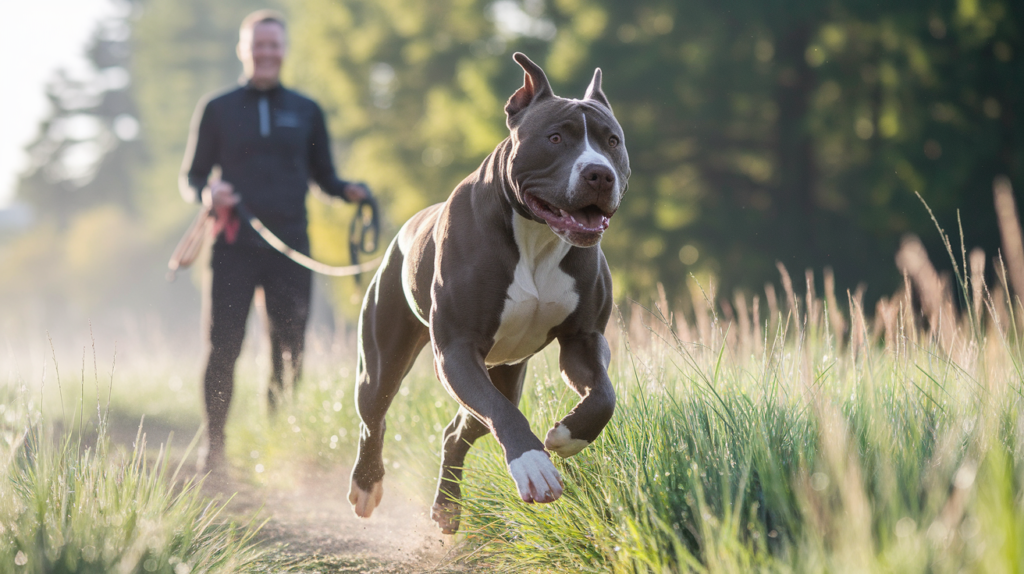
Pit bulls are athletic dogs with significant energy reserves. Underexercised pit bulls often develop problematic behaviors like:
- Destructive chewing
- Nuisance barking
- Digging
- Hyperactivity indoors
Expert Recommendation: Aim for 1-2 hours of physical activity daily, including walks, play sessions, and strength-building exercises appropriate for your dog’s age and health status.
Neglecting Mental Stimulation
These intelligent dogs need cognitive challenges as much as physical ones:
- Food puzzles and enrichment toys
- Training sessions focusing on new skills
- Scent work activities
- Interactive play that requires problem-solving
Expert Recommendation: Incorporate at least 20-30 minutes of mental enrichment activities daily.
Inconsistent Training Approaches
Pit bulls thrive with clear boundaries and consistent expectations:
| Training Element | Ineffective Approach | Effective Approach |
|---|---|---|
| Command Consistency | Using different words for the same behavior | Using the same word every time |
| Response to Unwanted Behavior | Punitive measures or yelling | Redirecting to appropriate behavior |
| Reward Timing | Delayed rewards | Immediate reinforcement |
| Family Involvement | Different rules from different family members | Consistent expectations from all |
Expert Recommendation: Use positive reinforcement training methods that focus on rewarding desired behaviors rather than punishing unwanted ones.
Success Stories: Properly Socialized Pit Bulls
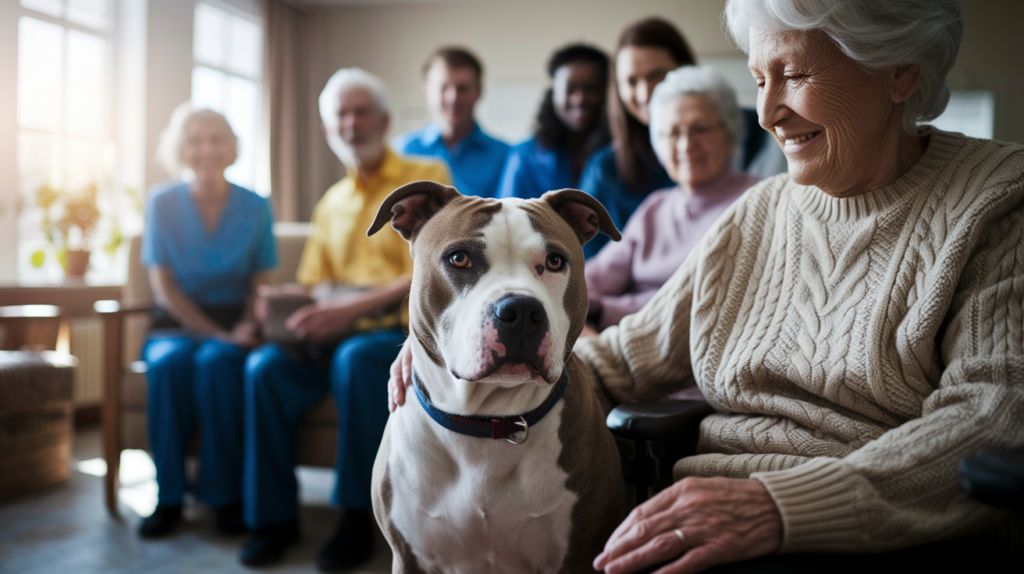
The transformation possible with proper socialization is remarkable. Consider these real-life examples:
Buddy: From Shelter Dog to Therapy Star
Rescued at 8 months with limited socialization, Buddy displayed fearful behavior around strangers. After six months of dedicated socialization work with professional guidance, he now works as a certified therapy dog, visiting hospitals and nursing homes.
Daisy: The Neighborhood Ambassador
Once reactive toward other dogs due to limited early socialization, Daisy underwent a structured desensitization program. Today, she serves as her owner’s partner in educating the community about responsible pit bull ownership.
These success stories demonstrate that with proper socialization and training, pit bulls can not only overcome the stereotypes they face but actively work to change them.
Resources for Pit Bull Owners
Support and education are essential components of responsible pit bull ownership:
Recommended Organizations
Pit bulls require regular physical activity to prevent behavioral issues.
- Pit Bull Rescue Central: Offers educational resources and support
- Animal Farm Foundation: Provides advocacy and education about pit bulls
- The American Bully Kennel Club: Offers guidance on breed standards and appropriate training
Training Resources
- Force-free trainers with pit bull experience (search certification organizations like CPDT-KA or KPA)
- Pit bull-specific training books and online courses
- Local pit bull meetup groups for socialization opportunities
Conclusion
The single biggest mistake owners make—inadequate socialization—stems from either underestimating its importance or misunderstanding how to implement it effectively. By recognizing this pitfall and taking proactive steps to provide comprehensive socialization experiences, you can help your dog develop into the confident, friendly ambassador the breed deserves. Remember, your dog’s happiness and your community’s perception of the breed are significantly influenced by your efforts.
Mental stimulation is equally important for a pit bull’s overall well-being.
Remember that proper socialization isn’t just about exposure; it’s about creating positive associations with new experiences in a controlled, supportive environment. Whether you’re starting with a puppy or working with an adult dog, improvement is always possible with patience, consistency, and the right approach.
By avoiding this critical mistake, you’re not just enhancing your dog’s quality of life—you’re contributing to a more positive perception of pit bulls everywhere. Your well-socialized, confident pit bull becomes living proof of what these dogs can be when given the proper guidance and care.
FAQs About Pit Bull Socialization
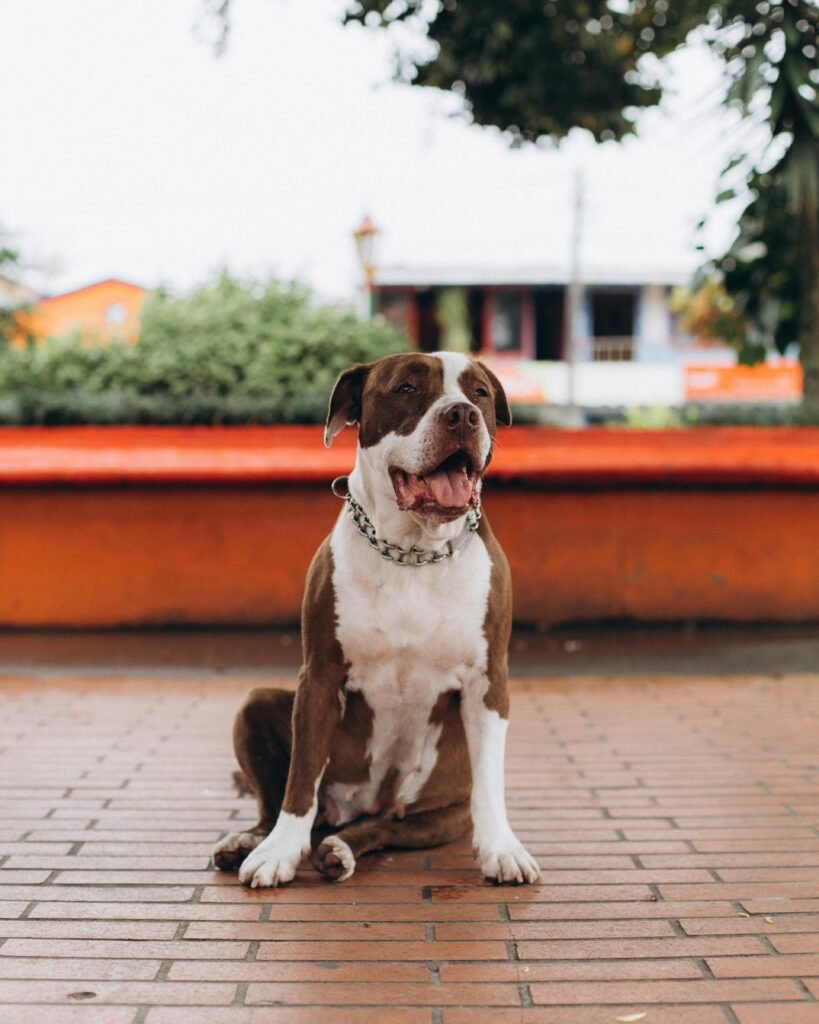
1. Is it too late to socialize my adult pit bull?
No, it’s never too late to improve your dog’s socialization, though the approach differs from puppy socialization. Adult dogs with socialization gaps benefit from gradual exposure, professional guidance, and patience. The process may take longer, but significant improvements are possible at any age.
2. How can I socialize my pit bull if breed-specific legislation restricts where we can go?
Focus on quality over quantity. Arrange controlled meet-ups with friends and their well-behaved dogs in private spaces. Create diverse experiences at home by inviting different visitors and varying your dog’s environment. Online communities can help connect you with pit-friendly resources in your area.
3. My pit bull seems reactive to certain triggers despite socialization attempts. What should I do?
Reactivity often requires specialized training beyond basic socialization. Consult with a certified force-free trainer experienced with reactive dogs. They can help create a desensitization protocol specific to your dog’s triggers. Management strategies are also important while working through reactivity issues.
With the right support, even the most timid pit bulls can become confident community members.
4. How much socialization is too much for a pit bull puppy?
Watch for signs of overstimulation including excessive mouthing, inability to settle, withdrawal, or stress signals like yawning and lip licking. Quality socialization focuses on positive experiences rather than quantity. Short, positive exposure sessions followed by rest are more effective than marathon socialization events.
5. Can proper socialization completely eliminate aggression risks in pit bulls?
No responsible professional would guarantee that any dog will never show aggression, regardless of breed. However, comprehensive socialization significantly reduces the risk of fear-based reactivity and aggression. Combined with ongoing training, management appropriate to the individual dog, and awareness of your dog’s body language, socialization forms the foundation of responsible ownership.
Meta Description
Learn the common mistakes pit bull owners make and how proper socialization can create well-adjusted companions.
As a responsible pit bull owner, your efforts to socialize your pit bull contribute to their happiness and wellbeing, while also positively influencing public perception of the breed.

